How Illicit Logging Is Destroying Ecosystems, Lives, And Livelihoods In Kogi Communities
By Adeyemi Adekunle
Indiscriminate tree-felling activities in Kogi are affecting the long-term sustainability of natural resources and threatening the lives and livelihoods of indigenous people.
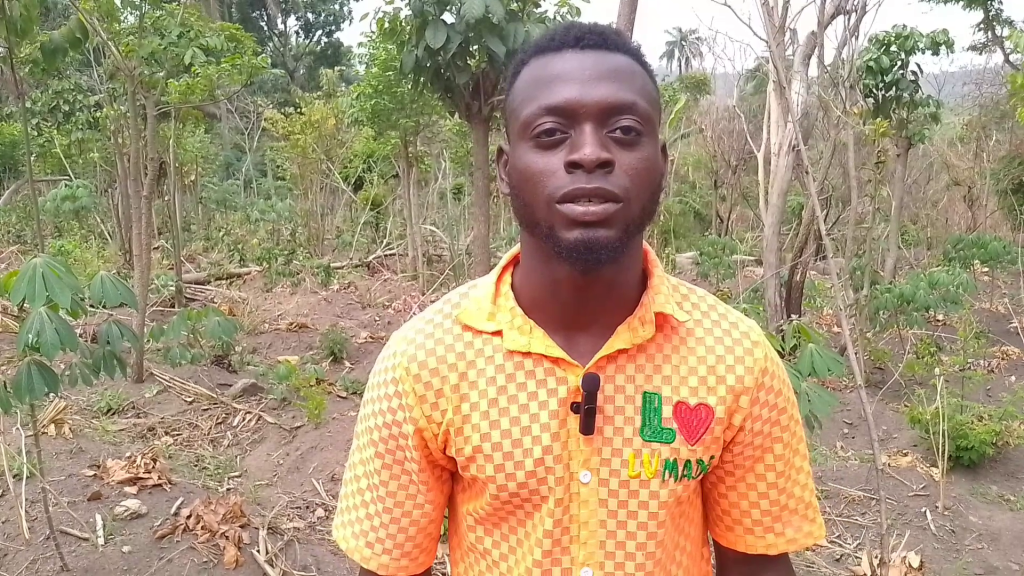
Bukola Adeparusi on the farmland where his mother was maimed, near Ponyan community.
For Bukola Adeparusi, March 12, 2020, will always be a day of tragedy that cannot be easily forgotten. It was the day his mother, a petty trader and farmer in Nigeria’s Kogi state, was killed. A few weeks before her death, she had an altercation with a sawmiller who had just been licensed to cut down trees on her farmland.
“It is ancestral land that has transcended over three generations,” Bukola said.
“While trying to stop them from cutting down the trees, she was hit with a gun butt on her head. She died before the end of the week.”
Bukola believes his mother would still be alive were it not for the increased logging activities in the area encouraged by the Kogi government’s thirst for more revenue. Other locals also say this development has sparked a dangerous cycle of environmental exploitation and insecurity.
Ayetoro, a community in the state, welcomes first-time visitors with the sound of saw chains cutting through wood and echoes through dense forests. It was not always this intense.
Kogi communities like Ayetoro, Alu, Ejuku, Igbaagun, Ife-Olukotun, Isanlu, Oranre, and Ponyan have long relied on a regulated timber industry for livelihood and government revenue. They conserve natural resources by making sure to plant more trees as they cut old ones.
“These communities in Okunland have traditionally tapped into the bounty of nature not only for sustenance but also as the spinal cord of the protection of their deities. For an indigenous person to cut down any tree either for shelter or to earn a living, there is a tradition of planting tree seedlings back,” said Saheed Makanju, a farmer from Oranre who now resides in Ejuku.
However, everything changed in 2020.
Locals started seeing an influx of loggers, who operate with violence and crudeness. With the confidence of these actors, they believe they must have received some licence from the state authorities, which has seemingly turned a blind eye to their activities. The developments threaten the forest ecosystem and have created tensions within the communities.
Adelani Adeyeye, an environmental risk expert, said the high rate of illegal logging in Nigeria is already appalling, and ignorance of the need for forests and ineffective regulatory government policies are further killing the country’s ecosystems.
“Illicit activities leading to cutting down trees that are for ecosystem protection are now seen as normal, most especially within rural communities. What used to be illegal is now receiving backing. While some of these people from indigenous communities are not ignorant of the values of the forest, the perpetrators see it as a source of revenue.”
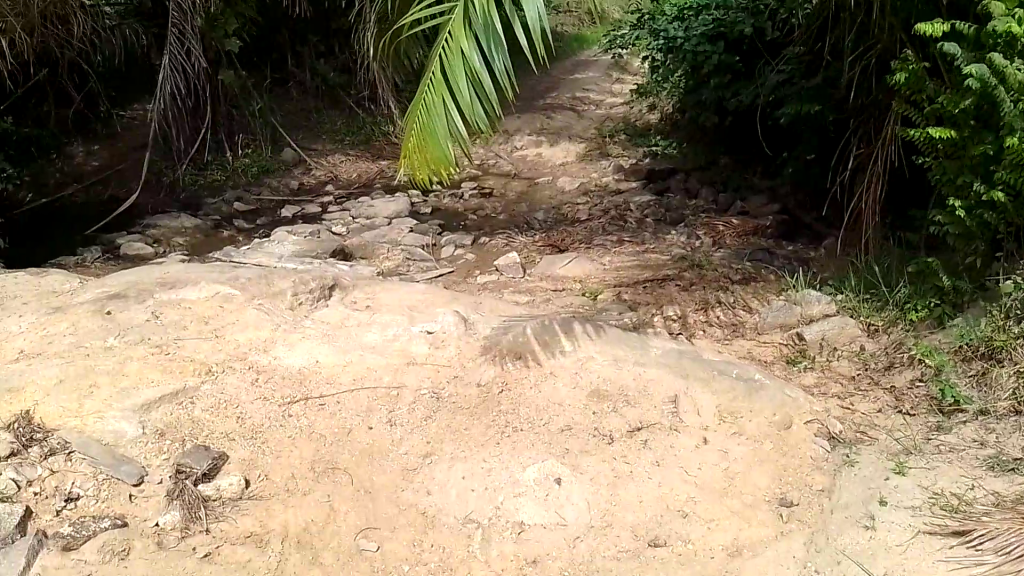
One of the dirt roads used for illicit trades in Kogi.
The beginning of nightmares
Unethical loggers’ indiscriminate tree-felling activities are affecting the long-term sustainability of natural resources, disrupting ecosystems, degrading watersheds, and making forest areas less biodiverse. Additionally, their activities threaten the lives and livelihoods of indigenous people.
Otitolaye Emma has been a registered member of the Timber Merchants Association in Ife-Olukotun for over 10 years. It has been his source of livelihood, helping him meet his family’s daily financial expenses.
But in 2017, the narrative changed when the state government announced to the association that it was increasing how much its members needed to pay into its coffers annually from ₦23,000 to ₦65,000. Three years later, the levy was again raised to ₦133,000, one of the highest obtainable for timber merchants across the country.
Otitolaye complied since he had no other source of income, but it was the beginning of unending nightmares for him and other timber merchants.
The hike in the annual levy forced some people out of the trade, creating a vacuum that was exploited by loggers who are not native to the area and who are not committed to the same standards.
One afternoon in 2020, Otitolaye’s younger brother came bearing bad news. Two of his sawmen had been kidnapped on the land allotted to him as a sawmiller. “I became confused because such had never been heard of in our land,” Otitolaye said. After he managed to raise the ransom and the men were released, he found that one of them had his hand amputated while the second was seriously injured.
“We have had various encounters with these people. Not only are they after our trees, but after our lives. We have lost members, operators of saw machines, and people being maimed.”
This, he says, contrasts sharply with the community’s peaceful history.
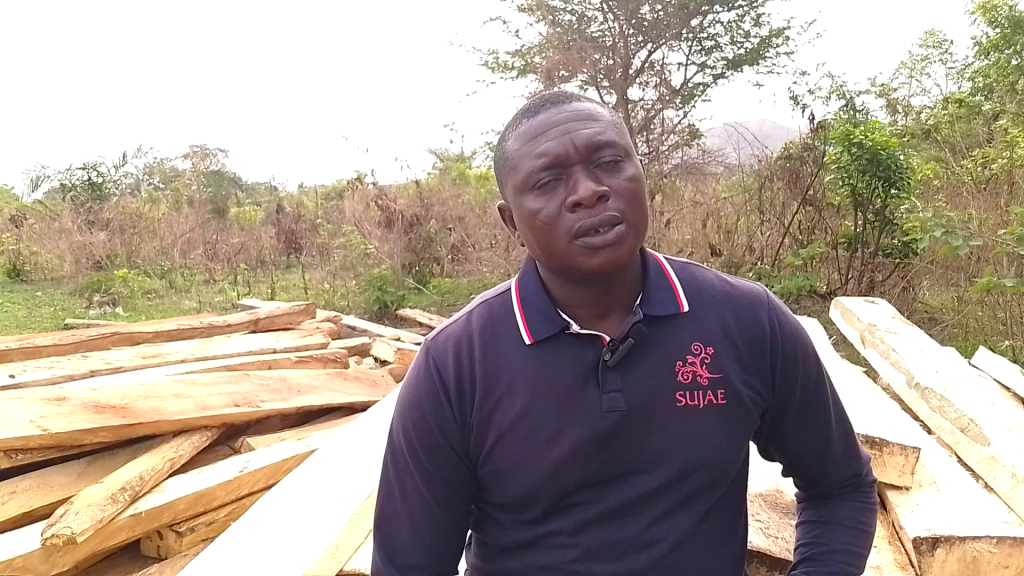
Otitolaye Emma, a farmer and secretary of the Timber Merchants Association in Ife-Olukotun.
Illyasu Musa, who is a native of Okenne and a farmer in Ponyan, has lost loved ones to the development.
“I lost one of my siblings on my farmland. Another got his left arm cut off, while the youngest among my siblings had three fingers from his right hand chopped off,” he narrated.
“What did they do wrong? For defending what they rightfully owned, it’s now I know we are not equal under the law. Many times, we have gathered ourselves for peaceful assembly. We are warned that not until the police give us the go-ahead, we can not do anything, and for fear of being unlawfully detained, we jettison such a move.”
The new wave of loggers are not only operating in the forests but have also trespassed on farmlands. Their dastardly acts have affected people like Otitolaye, who says the forest he used to access easily has become untouchable.
“The forest trees in our community are being cleared and moved en masse as a result of illegal logging,” he said.
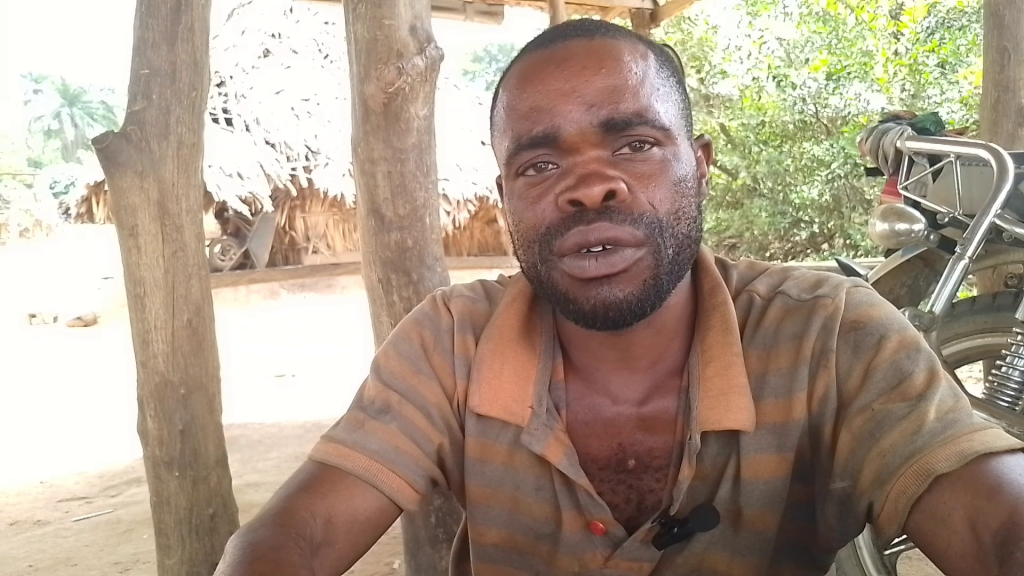
- Business
- Casino and Sports Betting
- Digital Marketing
- Education
- Entertainment
- General
- General News
- Health
- Lifestyle
- Politics
- Sports
- Tech
- Tinubu-Shettima
- Worship
- Business
- Casino and Sports Betting
- Digital Marketing
- Education
- Entertainment
- General
- General News
- Health
- Lifestyle
- Politics
- Sports
- Tech
- Tinubu-Shettima
- Worship
Illyasu Musa, a farmer, and two of his siblings had their hands macheted by illegal loggers.
Data from Global Forest Watch, which monitors land use worldwide, shows an appalling rate of deforestation in Nigeria, much of it due to illegal logging.
The country lost 13 per cent of its tree cover between 2001 and 2023, with Kogi being the seventh worst-hit state. Between 2001 and 2022, Nigeria released 30.4 metric tons of carbon into the atmosphere as a result of tree loss. Kogi state specifically lost 27 per cent of its tree cover (68,400 hectares) between 2001 and 2023.
According to the Food and Agriculture Organization (FAO), Nigeria loses about 350,000 to 400,000 hectares to deforestation every year.
Meanwhile, the unbridled logging operations in Kogi have also affected medicinal and protected tree species — like Afara, Mahogany, and Obeche — which are becoming more difficult to find.
Saliu Tajudeen, a farmer and timber trader, said that traditionally, people like him also engage in farming because logging is not done constantly to protect the environment. It is a seasonal activity for each licensed logger. But then the new actors do not abide by the same rules.
“The guidelines laid down by the government are that when you take down a tree, you must plant five tree seedlings to replace the one you took, and that’s what we have been doing here for decades,” he explained.
“If you are from Okunland, there are trees you know not to touch because they are kept by various communities for cultural purposes. But all these trees, despite being sacred, been been cut down by these miscreants.”
Ino Ekpang, a farmer who arrived in Ponyan more than two decades ago, believes deforestation is now difficult to curb because, due to the economic downturn, it is seen as a source of income for the locals.
“Boys enter people’s ancestral lands, cut down the trees, and sell them to wood companies for profits,” he said. “But all these actions are with cost. Whenever they carry out their illicit activities, what they do first is to cut down crops that could hinder their movement.”
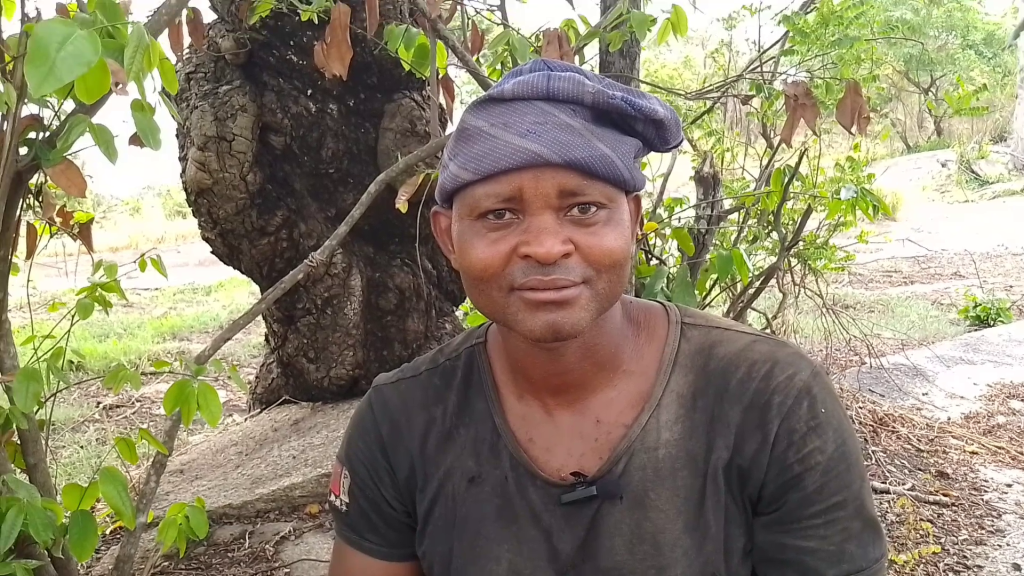
Tajudeen Salako, a hunter, says he has been shot at thrice while struggling with illegal loggers on his farm at Ayetoro.
Counting losses
Gabriel Olanrewaju, a farmer and chairman of the timber merchants group in Ayetoro, Yagba East area of Kogi, describes the rate of illegal logging in his community as alarming and says it has caused extensive damage to his farmland.
Without support from the state or federal government, he says, farmers have to take loans to get capital, which they pay back with heavy interest.
“Every time you hear engines in my community now, cutting down trees, even sacred ones, it is annoying. We are going through too much trouble. When they come, the first thing they (illegal loggers) do is clear our farms and our crops. These are crops we have collected loans to purchase. For example, if you have borrowed ₦500,000, at the end of the year, you pay back ₦1 million,” Gabriel said.
“We who could feed people before are now living hand to mouth all because the government gains more from these people and receives kickbacks from their illicit activities. You can not do them anything; they have tagged themselves landowners.”
He said many people in his community are leaving farming because of the huge losses they now encounter. He described 2023 as the worst year of his life as a farmer. He lost over 5 acres of cassava farms, which were supposed to fetch him an average of ₦10 million to ₦15 million, to illegal logging.
“Another adverse impact is insecurity. Before, I could move in the night to neighbouring communities. But now, if I want to stay alive for my family, I must not stay on this farm until 2 p.m. and outside my house anytime from 6 p.m. I must be indoors because of the insecurity that has emanated from these illicit activities. Anyone they meet on the farm when they are coming for their activities will get beaten or worse,” Gabriel said.
The trend of excessive logging has also affected the state of the roads linking rural communities such as Igbaagun, which is recognised as a model of forest conservation.
Abdulmalik Alhassan, a farmer who practices agroforestry in Igbaagun, said illegal logging trucks have made the roads less motorable and made it difficult for farmers to get their produce to the market.
“Their logging trucks have created big ditches in the roads leading to my community. Now, I can only drive a motorcycle to the farm. Even though I have a car, I have to park it at Ijumu and then take a bike. I would have to stop and trek for another distance before I get to this community,” he said.
“I used to frequent my farm, but now I can’t for my safety because the brewing conflict here is alarming. The communities used to love each other, but now everyone is after his own safety, and that affects my productivity. The output is poor and I’m unable to expand. In a year, I used to harvest up to 40,000 to 50,000 tubers of yam. But in 2023, that never happened. I didn’t get up to 5,000 tubers because of the massive destruction on my farmland. Also, two of my ten labourers lost their lives.”
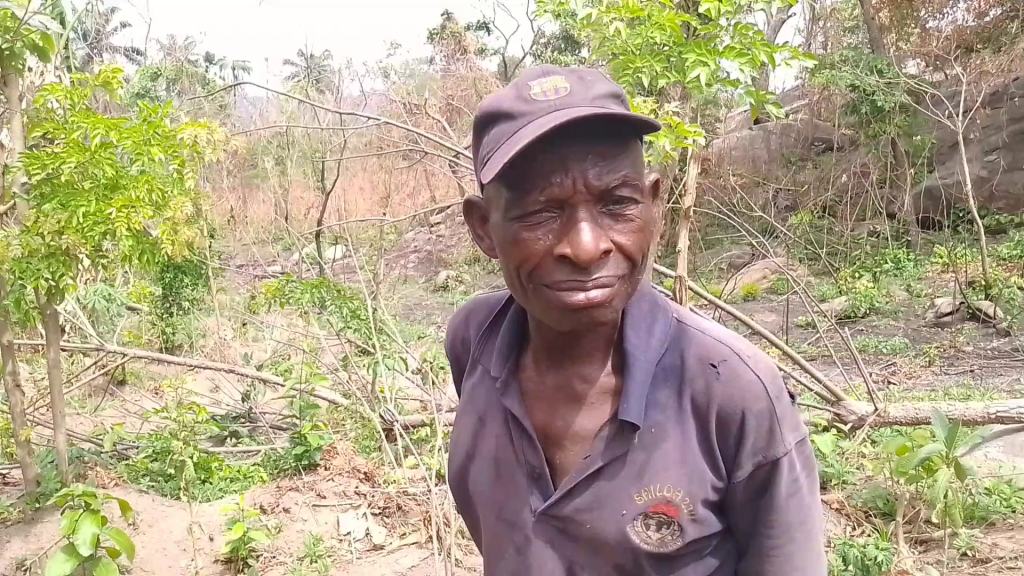
Dauda Ogunbanwo, 82, says his farm was attacked four times between February and March 2024.
Gov’t needs to step in
Babatunde Esho, an environmental analyst based in Kogi, says illegal logging will continue to thrive in Nigeria until the government stops benefitting.
“Everyone here knows the rules for cutting down trees, but these illegal loggers have ruined the peace in our land. They do not come with just a saw; they are armed to the teeth in case anyone stops them from carrying out their illicit business. And don’t forget all those trees do not even stop in Nigeria; they are taken outside the country,” he said.
He said the government needs to step in to prevent the destruction of the forests and farmlands. Otherwise, people would continue to lose their livelihoods in the name of internally generated revenue.
“What we are yet to come to terms with is the reality dancing right before our own eyes, people’s sustenance slipping away. Thousands of farmers are quitting their farmland because some people are now more powerful than the farmers themselves. The miscreants see themselves as more connected. They have arms, and the people who are threatened can’t raise their fingers to protest because the government currently feels that the farmers do not have the rights or the freedom to have a peaceful assembly.”
Experts say if the spate of attacks on farmers across the country continues, it will have a serious effect on food production and security.
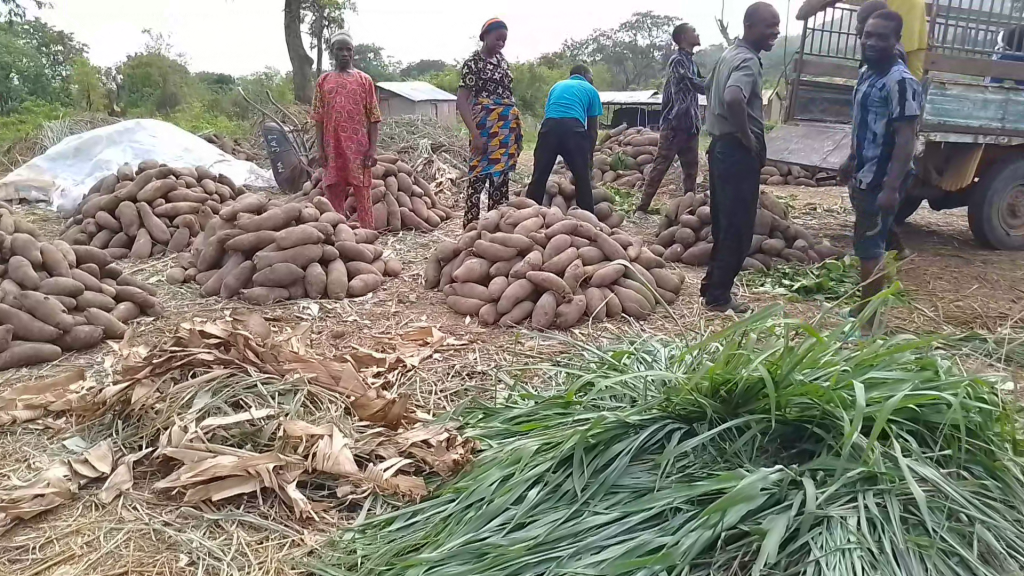
The biggest yam market in Yagba East Local Government Area now lives on past glory due to meagre farm produce.
Basking in obsolete laws
Nigeria became a party to the Paris Agreement in 2017, which provides that parties should take action to preserve, conserve, and enhance sinks and reservoirs of greenhouse gases, including forests.
The federal government has made efforts to conserve the nation’s forests, one of which was the ban on charcoal wood and charcoal exports. However, the success of that ban has been in question due to the actions of some state governments that grant access to forests without any single control.
Despite having significant power, the federal government’s ability to protect the country’s forests is limited due to the primary responsibility lying with the state governments, says Rasak Kolawole, a former director at the Ministry of Environment’s Department of Forestry.
In Nigeria, each state has its own regulations, policies, and institutions that govern the management and protection of forests within its territory. This decentralised approach means that state governments have more control over forest management than the federal government. Consequently, the federal government’s ability to regulate and monitor the activities of individuals and organisations that may harm the forests is limited.
“Moreover, there are also issues of inadequate funding, personnel, and technology that further hinder the federal government’s ability to effectively protect the country’s forests,” he explained.
“Addressing the challenges facing forest protection in Nigeria will require a coordinated effort between the federal and state governments, as well as the active participation of local communities and other stakeholders.”
He added that another problem that hampers the government is the obsolete nature of laws still being enforced in most states.
“The penalties of the 1950s and 1960s are still there. The penalties of paying ₦1 and ₦3. However, some of the states are already reviewing their forestry laws. But in the current situation in Kogi, despite being obsolete, the action of the state government fuels conflicts and insecurity, and the laws don’t apply,” he said.
This publication’s efforts to get the reaction of the Ministry of Environment in Kogi through calls and texts to the Commissioner of Environment and Ecological Management, Joseph Oluwasegun, were unsuccessful.
As the world begins the Decade of Ecosystem Restoration, the people of Yagba East are tired of the government not taking decisive action to restore and preserve their forests and protect the people who depend on them.
Hassan Adaranijo, a resident of Igbaagun, believes the government’s focus should be on empowering the farmers in the state.
It can achieve this, he said, “by providing soft loans to farmers and supporting the creation of milling farms; these initiatives would not only benefit the farmers but also boost the internally generated revenue (IGR) of the state”.
Hassan emphasised that the government’s initiatives should prioritise the safety and well-being of the indigenous people and stated that it is possible to achieve economic growth without putting the people in harm’s way.
The reporting was completed with the support from the Centre for Journalism Innovation and Development, Hope Behind Bars Africa, the International Centre for Investigative Reporting and the Open Society Foundations

A Nigerian trained investigative journalist, who cover various news beats in Nigeria.










